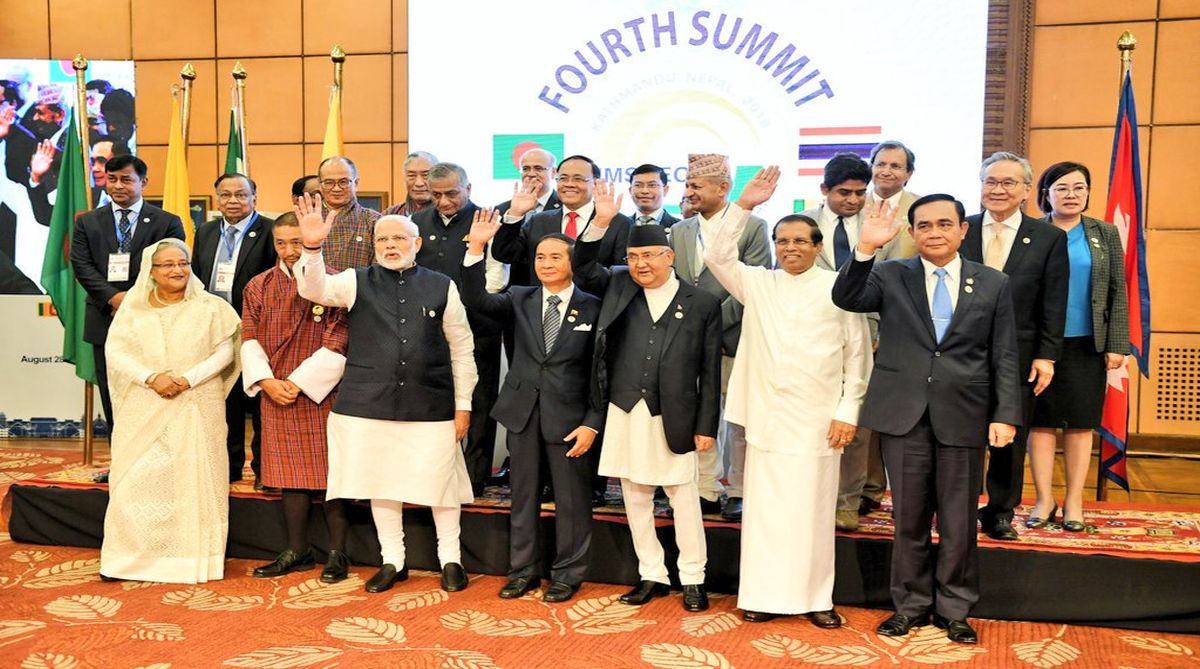PM lauds sanitation workers and police for efforts to keep Mahakumbh clean
He highlighted its grandeur, divinity, Sanatan heritage, cleanliness, and seamless public management, earning national and global praise.
Prime Minister Oli, the current chair of the BIMSTEC, presented a draft of the Kathmandu Declaration, which was unanimously adopted by the member states.

Photo: Twitter (@MEAIndia)
The Fourth BIMSTEC Summit concluded in Kathmandu on Friday after issuing an 18-point Kathmandu Declaration.
Prime Minister Narendra Modi and the top leaders of other BIMSTEC member states attended the two-day summit in Kathmandu.
Advertisement
The declaration is expected to enhance the effectiveness of BIMSTEC Secretariat by engaging it in various technical and economic activities in the region.
Advertisement
The Kathmandu Declaration has underlined the importance of multidimensional connectivity as a key enabler to economic integration for shared prosperity of the region. The declaration also highlighted the importance of trade and investment as one of the major contributing factors for fostering economic and social development in the region.
BIMSTEC family! PM @narendramodi and MoS @Gen_VKSingh among other dignitaries at the Closing ceremony group photograph. Leaders welcomed Sri Lanka as the new Chair of BIMSTEC. 4th BIMSTEC Summit Declaration available at https://t.co/pCSNkzYum5 pic.twitter.com/km685Aw3Bt
— Raveesh Kumar (@MEAIndia) August 31, 2018
The BIMSTEC leaders strongly condemned terrorism in all its forms and manifestations and stressed that there can be no justification whatsoever for any act of terrorism. They also affirmed that the fight against terrorism should target not only terrorists, terror organizations and networks but also identify and hold accountable States and non-State entities that encourage, support or finance terrorism, provide sanctuaries to terrorists and terror groups and falsely extol their virtues.
As the BIMSTEC summit concluded successfully, Nepal Prime Minister K P Sharma Oli handed over the chairmanship of the grouping to Sri Lankan President Maithripala Sirisena.
Prime Minister Oli, the current chair of the BIMSTEC, presented a draft of the Kathmandu Declaration, which was unanimously adopted by the member states.
Addressing the closing session, Oli said collective wisdom, thought and vision on the goal of peaceful, prosperous and sustainable Bay of Bengal region is eloquently captured in the Kathmandu declaration.
The member states also signed a Memorandum of Understanding (MoU) for the establishment of a Bimstec Gird Interconnection to enhance energy cooperation among the member states.
Working towards energy security! MoS @Gen_VKSingh and other #BIMSTEC Foreign Ministers signed an MoU on Grid Interconnection. The MoU provides for optimization of using energy resources in the region & promotion of efficient & secure operation of power system, among other things. pic.twitter.com/YIUjBivP1z
— Raveesh Kumar (@MEAIndia) August 31, 2018
At the conclusion of the summit, Oli said: “This is my firm conviction that this summit has been a significant step towards making Bimstec a dynamic, effective and result-oriented organisation.”
Oli congratulated Sri Lanka for assuming the role as the new host for BIMSTEC and extended thanks to the heads of states/governments of member states for their support in materialising the summit with success.
Bimstec, which came into existence on June 6, 1997, comprises seven countries lying in the littoral and adjacent areas of the Bay of Bengal — Bangladesh, Bhutan, India, Myanmar, Nepal, Sri Lanka and Thailand.
The bloc brings together 1.6 billion people, or 22 per cent of the world’s population, and has a combined GDP of $2.8 trillion.
(With agency inputs)
Advertisement